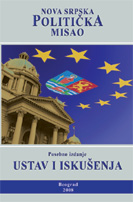|
From the outset, the West has made no secret of its desire for Kosovo to obtain independence. Ischinger has admitted that he saw the Troika process as a means for persuading the Serbs to accept Kosovo's independence. In his eyes, despite his claims that he would consider “every possible solution,” obtaining an agreement for independence was the sole purpose of the process. This is why serious consideration was given only to Pristina's proposal for post-independence “good neighbourly relations.” The ideas put forward by Belgrade were ignored and cast aside without any real discussion. Well aware of the criticism it had received during the UNOSEK process, Belgrade made a positive effort to put forward a clearly defined and generous form of autonomy, illustrated by successful models already in use elsewhere in the world (eg. in Hong Kong). Belgrade was keen to fully co-operate and make every effort to put forward solutions that would give Albanians self-rule, but inside the borders of Serbia – but no one was interested. Ischinger had already decided, with full support of the West, that Kosovo should become independent, and did not want an agreement unless this would be the outcome. If Belgrade could not be persuaded (or forced) to agree to independence, then a situation would be created to enable Pristina to declare independence unilaterally. Ischinger's assertion that the Troika would leave “no stone unturned” was a lie. The negotiations were a means of obtaining legitimisation of the Ahtisaari Plan (which due to Russian objections would not get through the UN Security Council), and were used to silence Russia's call for more negotiations. Basically, neither the Troika process nor the UNOSEK process stood a chance of success because the West had led the Albanians to believe that they would get their independence anyway. Hence there was no incentive to discuss anything else, no matter how favourable to them it may have been. If this promise of independence had not been made, then the Albanians, knowing that independence was not guaranteed, would have discussed other options to give themselves as much control of the territory as possible. As was once said by one of the mediators, “The crux of the matter is not whether Kosovo should become independent, but whether it could be returned to Belgrade's rule.” If that was really the case, then independence was not the only solution, as Kosovo does not have to be independent to be free of Belgrade's rule. For example, to give Kosovo extensive autonomy, at least equal to that which it enjoyed under the 1974 Constitution, would ensure that it would be free from Belgrade's rule. Such a consideration would be enough to make one think that the determination to make Kosovo independent was not about freeing the Albanians from Serbian rule, but about fulfilling the West's own agenda. Ironically, Kosovo would actually have had more control over itself if it had been granted substantial autonomy within Serbian borders. As Kosovo cannot “stand on its own feet,” the powers of the international presence are much greater than they would have been if it had remained inside Serbia. For example, it would not have been necessary for the international presence to have powers to override decisions made by the Kosovo government or dismiss government officials, thus undermining the authority of the government. Belgrade would not have had such powers either, as the idea was to keep Kosovo as a part of Serbia, but free from Belgrade's rule. In other words, Kosovo would have been free to govern itself, with only guidance from the international community to ensure that it acted professionally and in accordance with the agreement (which would also form the basis of its constitution). The Ahtisaari Plan has only succeeded in making Kosovo a EU protectorate outside Serbian borders (for those who recognise independence, that is), rather than a UN protectorate inside Serbian borders. It seems that this was probably Ahtisaari's intention all along, as he and his team were well aware that Kosovo with its current problems would not be viable as a state and would be incapable of supporting itself. Unfortunately, Ahtisaari and his team also believed autonomy to be unsustainable long-term – hence their idea of a “compromise solution” in the form of supervised independence – a compromise because it was somewhere between perceived unsustainable autonomy and full independence, for which Kosovo is neither capable nor ready. The Ahtisaari Plan cannot be a permanent solution, as Kosovo's life in a state of limbo is unsustainable and must be brought to an end. It does not solve anything simply by changing the characteristics of the limbo. Kosovo needs a proper status that can become permanent, and allow it to prosper and lead a peaceful existence. This is why a return to negotiations is necessary. May 2008 |




.jpg)




















